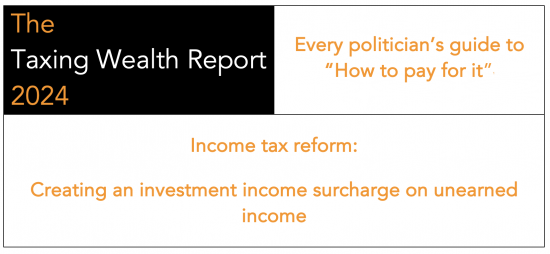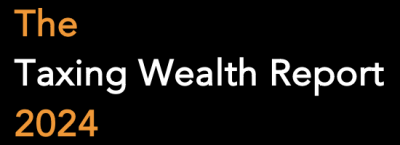I have this morning published the sixth of my recommendations for reform of the UK tax system. Together with the further recommendations yet to be published, these will make up the Taxing Wealth Report 2024 in due course.
This recommendation proposes the reintroduction of an investment income surcharge in the UK tax system of the sort that we had until 1984. This charged an additional 15% income tax on income from unearned sources above an agreed annual limit to compensate for the fact that national insurance was not paid on that income. The current proposal is innovative by adding capital gains into this charge, which assumes that they will, as previously recommended, be taxed as the top part of income.

The summary of the note that supports this recommendation says:
Brief summary
This note suggests that:
- It is inequitable that those with unearned income in the UK do not make a contribution equivalent to national insurance at present.
- Such a contribution could be made by recreating the investment income surcharge that was included in the income tax system and which was applied to unearned income at a rate of 15% until 1984.
- This charge could also be extended to capital gains.
- This charge would be collected via a person's self-assessment tax return for each year.
- This charge would only be applied to investment income and gains (excluding pensions) exceeding £5,000 in a year. This sum takes into account the fact that almost all those paying would have already had the benefit of a national insurance allowance in the year. A higher ceiling could be set for pensioners.
- This charge would raise approximately £7.1 billion in tax each year if capital gains were not taken into consideration. This sum would increase to approximately £18 billion per annum if capital gains were taken into account.
Discussion
The reintroduction of an investment income surcharge into the UK tax system makes complete sense. It is entirely inappropriate that income from work is taxed much more heavily in the UK than is income from unearned sources at present. This measure seeks to address that issue by broadly replicating the employee's national insurance charge on higher levels of unearned income.
The extension of this proposed charge to capital gains makes complete sense. As explained in the methodology note that forms a part of the Taxing Wealth Report 2024 series, if a financial capital maintenance concept is assumed to be appropriate for tax ( and given the intimate relationship between tax and fiscal money, nothing else can be assumed) then all income from all sources should be treated equally for taxation purposes if horizontal tax equity is to be achieved, as is vital for the purposes of tax justice.
This charge would also eliminate much of the cause of tax avoidance activity by single-person companies operating through limited companies that seek to recategorise earned income as unearned income to avoid national insurance charges.
The revenue estimates appear to be surprising, with more being generated from the charge on capital gains than on investment income already subject to income tax, even though the latter exceeds the former by value. That is because of the considerable concentration of capital gains amongst a few relatively wealthy people, which this charge would undoubtedly help correct when it comes to the tax and inequality consequences of that fact.
Cumulative value of recommendations made
The six recommendations now made as part of the Taxing Wealth Report 2024 would, taking this latest proposal into account, raise total additional tax revenues of approximately £67.9 billion per annum.





